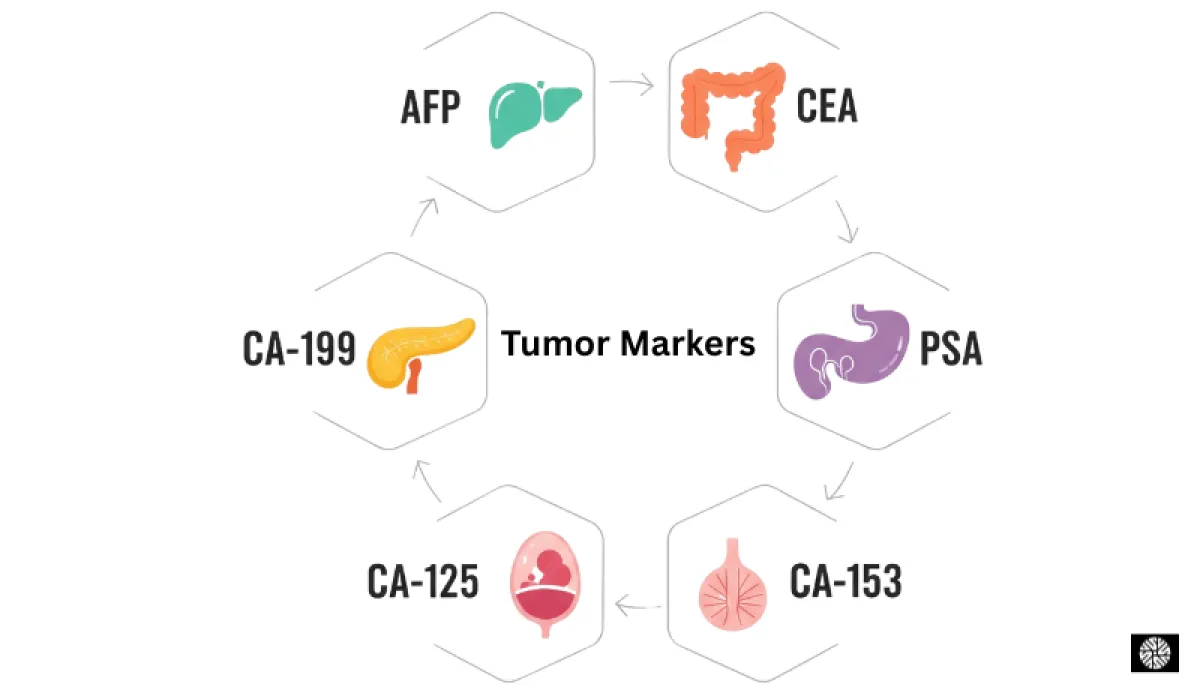Accessible Cancer Screening: How Taiwan Makes Comprehensive Tumor Marker Testing Affordable and Available
September 02, 2025

In the United States, getting comprehensive blood work that includes tumor markers can be a frustrating and expensive experience. Many Americans face high costs, insurance barriers, and limited access to these important screening tools. However, for those living in or visiting Taiwan, there's a refreshing alternative that prioritizes both accessibility and affordability.
The Challenge in the U.S.
Tumor marker blood tests in America often come with significant hurdles. Patients frequently encounter:
- High out-of-pocket costs, sometimes hundreds of dollars per test
- Insurance requirements for specific medical justifications
- Limited availability outside of oncology specialists
- Long wait times for appointments and results
These barriers can delay early detection and peace of mind for individuals who want to stay proactive about their health.
A Different Approach in Taiwan
Taiwan's healthcare landscape offers a stark contrast. Through medical concierge booking platforms like New Dawn Health, comprehensive tumor marker panels are currently included in Premium and Advanced holistic exam packages at Beitou Health Management Hospital, and as an add-on for our full body scan packages. This integrated approach makes preventive cancer screening both accessible and affordable.
The difference isn't just in cost, Taiwan's healthcare system recognizes that early detection saves both lives and healthcare costs in the long run, making these tests readily available as part of routine health management rather than treating them as specialized procedures.
Understanding Your Tumor Markers: A Complete Guide
When you receive your comprehensive panel results, you'll see several key markers. Here's what each one tells you:
AFP (Alpha-Fetoprotein)
What it screens for: Primarily liver cancer, but also testicular and ovarian cancers
Alpha-fetoprotein is a protein normally produced by the developing fetus. In healthy adults, AFP levels should be very low. Elevated levels can indicate liver cancer (hepatocellular carcinoma), which is particularly relevant given the higher prevalence of hepatitis B in Asia. AFP is also useful for monitoring testicular cancer in men and certain ovarian cancers in women.
Normal range: Generally less than 10-15 ng/mL, though this can vary by laboratory.
CEA (Carcinoembryonic Antigen)
What it screens for: Colorectal cancer, and potentially lung, breast, and pancreatic cancers
CEA is a protein that's normally present in very small amounts in healthy adults. While elevated levels don't definitively diagnose cancer, they can indicate the presence of colorectal cancer and are particularly useful for monitoring treatment effectiveness and detecting recurrence. Smokers typically have higher baseline CEA levels.
Normal range: Less than 2.5 ng/mL for non-smokers, less than 5.0 ng/mL for smokers.
CA-199 (Cancer Antigen 19-9)
What it screens for: Pancreatic cancer, and sometimes bile duct or gallbladder cancers
CA-199 is most commonly associated with pancreatic cancer screening. While not perfect as a standalone diagnostic tool, some people naturally don't produce this protein, it's valuable for monitoring treatment response and detecting recurrence. Elevated levels can also indicate bile duct problems or other gastrointestinal issues.
Normal range: Less than 37 U/mL.
PSA (Prostate-Specific Antigen)
What it screens for: Prostate cancer (men only)
PSA is produced by the prostate gland and is one of the most well-known tumor markers. While elevated PSA doesn't always mean cancer, benign prostate enlargement and infections can also raise levels, it's an important screening tool for men, especially those over 50. The trend of PSA levels over time is often more important than a single reading.
Normal range: Generally less than 4.0 ng/mL, though this varies with age and individual factors.
CA-125 (Cancer Antigen 125)
What it screens for: Ovarian cancer, and sometimes endometrial or fallopian tube cancers
CA-125 is particularly important for women's health screening. While it's most associated with ovarian cancer, levels can also be elevated due to endometriosis, pelvic inflammatory disease, or even normal menstruation. It's especially valuable for monitoring treatment response and detecting recurrence in women with a history of ovarian cancer.
Normal range: Less than 35 U/mL.
CA-153 (Cancer Antigen 15-3)
What it screens for: Breast cancer
CA-153 is primarily used for breast cancer monitoring, particularly for tracking treatment response and detecting recurrence in women who have been previously diagnosed. It's less useful as an initial screening tool but becomes valuable for ongoing monitoring. Elevated levels can also occur with other cancers or benign breast conditions.
Normal range: Less than 30 U/mL.
The Power of Comprehensive Screening
What makes these panels particularly valuable is having all markers tested together. This comprehensive approach can:
- Provide a baseline for future comparison
- Catch potential issues early when treatment is most effective
- Offer peace of mind through regular monitoring
- Enable healthcare providers to see patterns across multiple markers
Important Considerations
While tumor markers are powerful tools, it's essential to understand their limitations:
- Not diagnostic alone: Elevated markers don't automatically mean cancer. Many benign conditions can cause increases.
- False negatives possible: Some cancers don't produce elevated markers, especially in early stages.
- Individual variation: Normal ranges can vary between individuals and laboratories.
- Trend matters: Changes over time are often more significant than single readings.
Making Informed Healthcare Decisions
The accessibility of comprehensive tumor marker testing in Taiwan represents a significant advantage for health-conscious individuals. Whether you're an expat living in Taiwan, a frequent visitor, or considering medical tourism, having access to affordable, high-quality preventive screening can be a game-changer for your long-term health strategy.
Regular screening doesn't replace the need for other cancer prevention measures, maintaining a healthy lifestyle, following screening guidelines for mammograms and colonoscopies, and staying current with vaccinations remain crucial. However, tumor markers add an extra layer of monitoring that can provide early warning signs and valuable peace of mind.
Taking the Next Step
If you're interested in comprehensive tumor marker screening, consider discussing these options with your healthcare provider. For those in Taipei, New Dawn Health's partnership with Beitou Health Management Hospital and Central Clinic makes these important tests more accessible than ever.
The combination of accessibility, affordability, and comprehensive care in Taiwan's healthcare system makes consistent monitoring not just possible, but practical.
Disclaimer: This article is for informational purposes only and should not replace professional medical advice. Always consult with qualified healthcare providers about your individual screening needs and risk factors.


